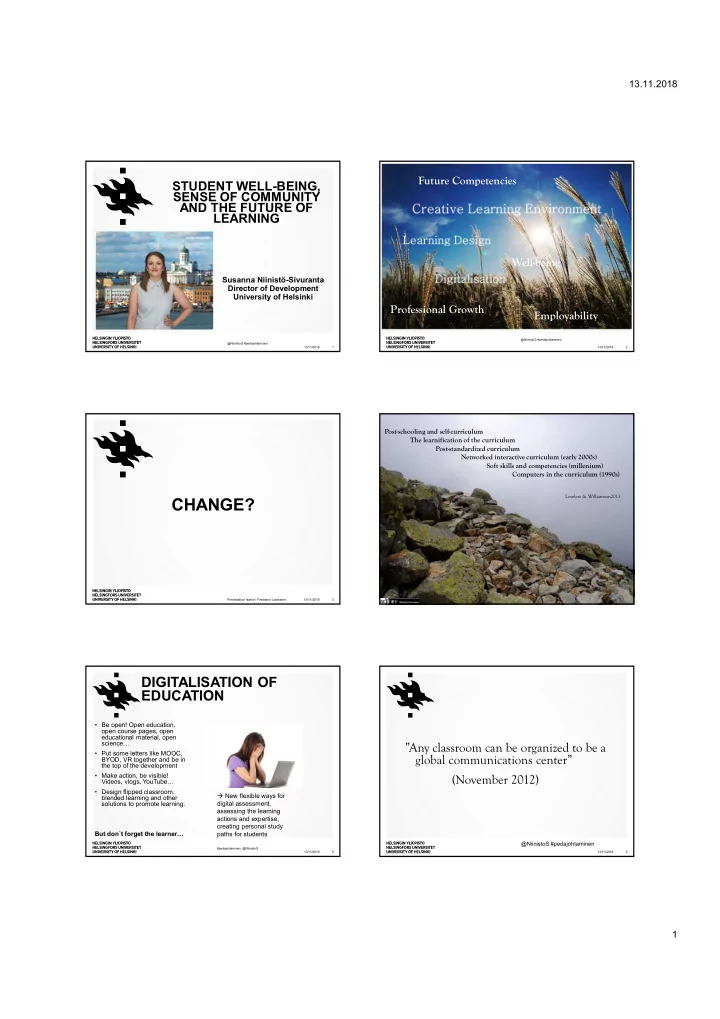

13.11.2018 Future Competencies STUDENT WELL-BEING, SENSE OF COMMUNITY AND THE FUTURE OF LEARNING Well-being Susanna Niinistö-Sivuranta Director of Development University of Helsinki Professional Growth Employability @NiinistoS #pedajohtaminen @NiinistoS #pedajohtaminen 13/11/2018 1 13/11/2018 2 Post-schooling and self-curriculum The learnification of the curriculum Post-standardized curriculum Networked interactive curriculum (early 2000s) Soft skills and competencies (millenium) Computers in the curriculum (1990s) Loveless & Williamson2013 CHANGE? Presentation Name / Firstname Lastname 13/11/2018 3 SNS DIGITALISATION OF EDUCATION • Be open! Open education, open course pages, open educational material, open science… ”Any classroom can be organized to be a • Put some letters like MOOC, global communications center” BYOD, VR together and be in the top of the development • Make action, be visible! (November 2012) Videos, vlogs, YouTube… • Design flipped classroom, New flexible ways for blended learning and other solutions to promote learning. digital assessment, assessing the learning actions and expertise, creating personal study But don`t forget the learner… paths for students @NiinistoS #pedajohtaminen #pedajohtaminen @NiinistoS 13/11/2018 5 13/11/2018 6 1
13.11.2018 CONCLUSION The demands of the digitalising world and working life on the one hand and the digital competences of Technology in itself does not speed up the learning process, but new learners on the other create challenges for it can be used to enrich the learning environment, to provide learning environments in higher education. pedagogical choice and to encourage the learner. Digitality as such is not a solution to the challenges of learning. The digitalisation of learning environments, the (Pfeffer & Reif 2015; Loveless & Williamson 2013.) expectations of the generations of learners, and the increasing openness of education are paving way for changes in pedagogy. Presentation Name / Firstname Lastname 13/11/2018 7 13/11/2018 8 ABOUT LEADERSHIP “…learning-centred leadership have often sought only to create the space for teachers to operate successfully , rather than for them to explore and develop their pedagogic capability.” THREATS? (Male, T. & Palaiologou, I. 2011) @NiinistoS Presentation Name / Firstname Lastname 13/11/2018 9 ABOUT WORKING LIFE ABOUT POLITICS The future of (working) life seems threatened, and the demand for new In the current political environment, increased competences might seem unreachable. openness and better results are expected from education. In the European context, the funding of higher education is increasingly based on degree progression and number of graduates. (Mathies & Ferland 2014.) Presentation Name / Firstname Lastname 13/11/2018 11 13/11/2018 12 2
13.11.2018 CONCLUSION Future? We must be able to guarantee a steady quality of education with reducing resources. University leaders’ focus on staff and institutional development is essential to ensure sustainable and scalable results. @NiinistoS #pedajohtaminen Presentation Name / Firstname Lastname 13/11/2018 13 13/11/2018 14 NEXT GENERATION NEXT GENERATION (POSITIVE THINKING) (WORRIED THINKING) Mental health issues and visionlessness are growing issues New student generations are commonly associated with among the young generations of learners, partly due to hyper-connected digital natives , who expect interactive increasing pressure to produce quick results as well as the and student-centred learning with high expectations of endless number of choices available. teachers and a rejection of 'sage on the stage' teaching. They There is an increasing need for student counselling and respond well to team work and show a high level of motivation study support in institutions of higher education. in developing the skills they see as useful . In addition to (Korkeakouluopiskelijoiden terveystutkimus 2016; Nuorisobarometri 2017.) acquiring specialist knowledge, there is a growing focus on transversal skills , including active citizenship. The need for social encounters as well as boundaries and guidance do not disappear when learning is transferred online due to advancements in technology. (EU-PLA-report 2017, Paris) @NiinistoS #pedajohtaminen @NiinistoS 13/11/2018 15 13/11/2018 16 IT´S ALL ABOUT PEOPLE CONCLUSION New generations of learners can place their own goals on learning and Communication culture make more choices based on their own preferences, when the whole world is open to them. Caring Compassion There is a need for research-based knowledge on the effects of different pedagogical solutions on learning. Technology in itself does not guarantee good learning results; we still need high quality encounters and time for interaction. #pedajohtaminen @NiinistoS @NiinistoS 13/11/2018 17 13/11/2018 18 3
13.11.2018 How can we develop a supportive interaction culture in our degree programme? Learning takes Share best practices/experiences about time pedagogical solutions or learning situations that support students to express their own ideas and feelings. @NiinistoS Presentation Name / Firstname Lastname 13/11/2018 19 REFERENCES Copassion-project. http://copassion.fi/en/ Day & Leithwood 2007. Successful Principal Leadership in Times of Change: An International Perspective Doyle, T. & Zakrajsek 2013. The New Science of Learning: How to Learn in Harmony With Your Brain Loveless, A. & Williamson, B . 2013. Learning Identities in a Digital Age Mathies, C. & Ferland, C. 2014 . The Fundamentals of Tracking Students. Journal of the European Higher Education Area. Policy, Practice and Institutional Engagement. No 2, 95 – 116. Male, T. & Palaiologou, I. 2011. Learning-centred leadership or pedagogical leadership? An alternative approach to leadership in education contexts. Niinistö-Sivuranta, S. 2013. Sanoista syntyy yhteinen merkitys? Kommunikointitaidot luovassa oppimisympäristössä ja ammatillisessa kasvussa ammattikorkeakoulun visuaalisilla suunnittelualoilla. November, A. 2012. Student as Global Communicator and Collaborator Pfeffer, T. & Reif, L. 2015. Digital Media: What Difference(s) do they Make for Universities? Journal of the European Higher Education Area, no 1, 79 – 101. Tapscott, D. 2009. Grown Up Digital: How the Net Generation is Changing Your World Williamson, B. 2015 . Digital education governance: data visualization, predictive analytics, and ‘real-time’ policy instruments Åhman, H. 2012. Mielen johtaminen organisaatiossa. SNS 4
Recommend
More recommend